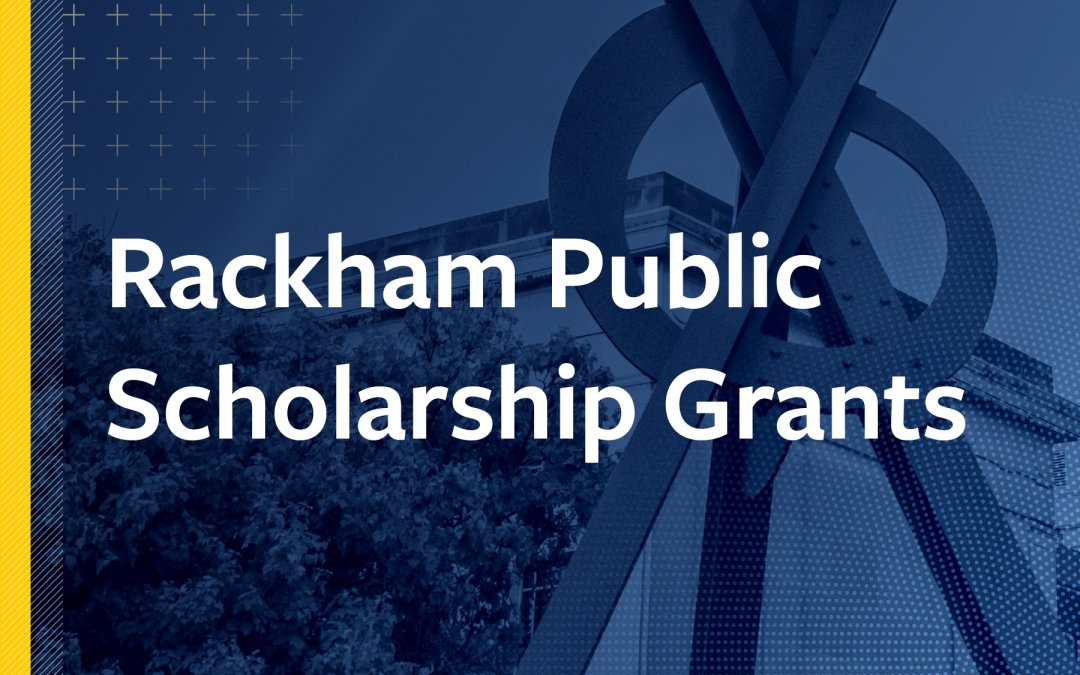Rackham is pleased to announce the 2023 Public Scholarship Grant awards for graduate students. Drawing on their research, students designed mutually beneficial collaborative work plans with community partner organizations to produce a public good—from strong local community impact, to state- and national-level political change.
The award recipients will complete their work across the United States and beyond, from developing mobile legal clinics in Rwanda to creating educational resources around the long-forgotten story of Detroit civil rights activist Sarah E. Ray. The projects selected for funding stood out in a pool of competitive applications for their equitable partnerships, ethical conduct with community participants, and concern for ensuring the inclusion of community knowledge alongside their research. The successful students each detailed a sustainable, innovative social, political, and/or economic impact beyond the academy.
“I am glad to see that Rackham is able to support these excellent students whose public scholarship projects will make a real difference,” says Arthur Verhoogt, Rackham associate dean for academic programs and initiatives in humanities and the arts and a professor of papyrology and Greek in the U-M Department of Classical Studies. “I am grateful for the community partners who are working collaboratively with the students on these projects and hope that the projects will have their intended outcomes.”
By choosing to make public engagement a part of their graduate education, this year’s cohort will be able to make distinct contributions to the community needs they serve, the practice of publicly engaged scholarship, and their research.
The Rackham Program in Public Scholarship has been supporting public scholarship on campus since 1998, when it began as the former Arts of Citizenship Program. Its mission is to support collaborative scholarly and creative endeavors that engage communities and co-create public goods while enhancing students’ professional development around public engagement and community-based learning.
This year’s grant recipients and their projects are:
Jacob Caponi
Ph.D. Candidate, Sociology
“Improving Access to Justice: Mobile Legal Clinics in Rwanda”
This project seeks to provide a curriculum at a critical juncture in Rwandan society where awareness of legal aid is increasing, while at the same time, people convicted of genocide are beginning to return home from prison. In the next four years, over 20,000 people are expected to return home from prison after being convicted of crimes of genocide. This curriculum will consider the intersectional influences of history, culture, and law to address the existing inequalities in accessing justice while also acting as a preventative for future injustices. Building on Haguruka’s awareness raising campaigns and the empirical data from legal aid cases throughout the country over the past five years, the curriculum developed from this project will address key areas of concern suggested by preliminary data analysis: gender-based violence, land law, and conflict mediation.
Anna Brotman-Krass
Ph.D. Student, Romance Languages and Literatures (Spanish)
“Theatrical Activist Performance into Film: Migrant Domestic Laborers and Care Workers in Spain”
Anna will travel to Spain this summer (2023) to continue her partnership with Territorio Doméstico (TD), a collective of artist-activist migrant women from Latin America who labor as domestic and care workers in Madrid. As a filmmaker and scholar, she will shoot and edit a short film in collaboration with TD to research the role of performance in grassroots feminist activism on migration and politics of care.
Soren Frykholm
Ph.D. Candidate, Anthropology
“The Place Where Knowledge Shines: Heritage and Public Engagement in Santiago Tilantongo, Oaxaca, Mexico”
Soren has partnered with leaders from Santiago Tilantongo and the Equator Initiative organization Natura Consultores to enhance community connection to its pre-Hispanic heritage while also promoting local economic opportunities. The project will improve tourism infrastructure by installing informational signage in multiple languages, training youth tour guides, and establishing a small community museum at the local archaeological site. Additionally, the project has founded a traveling children’s puppet theater that will perform the historical events that are recorded in the remarkable set of surviving pre-Hispanic Mixtec codices.
Rebeca Maxon
Ph.D. Candidate, Education and Psychology
“Southwest Detroit NextGen”
Rebecca will partner with Southwest Detroit NextGen on a project seeking to facilitate educational workshops that aid in building shared values, principals, and educational and spatial justice geared towards strengthening our creative economy during the one-day SWFest festival in Southwest Detroit. Through a series of educational workshops, they seek to fulfill the following goals: 1) increase sustainable systems of support among the collective, 2) expand their educational engagement with youth and creatives in their community, and 3) create an educational Zine that documents how SWFest aids in strengthening the Southwest Detroit creative economy using educational and spatial justice. Furthermore, these workshops will center our community as being experts in true community-based participatory practices that will be showcased and disseminated into our community via the Southwest Detroit NextGen Zine.
Rebecca Wai
Ph.D. Candidate, Political Science
“Maybe in My Backyard: How Refugee-Host Cooperation Promotes Peace and Prosperity”
Rebecca will partner with Northern Uganda Resilience Initiative (NURI), a non-governmental
organization (NGO) that supports refugees and host communities in Uganda, to evaluate their agricultural program that develops farmer groups. These groups are economic community institutions that foster cooperation and development among refugees and hosts in the agricultural sector, making up 80 percent of livelihoods in Uganda. In refugee settlements and host areas groups are often established by NGOs.
Júlia Irion Martins
Ph.D. Candidate, Comparative Literature
“Detroit’s Other Rosa Parks: Teaching the Civil Rights Legacy of Sarah E. Ray”
Júlia will partner with the Sarah E. Ray Project, whose objective is to document and bring awareness to the long-forgotten story of Detroit Civil Rights activist Sarah E. Ray (later known as Lizz Haskell). This project makes Ray’s life and work known in a variety of media accessible to diverse audiences, including a creative non-fiction book, a short documentary, and an interactive website. The guides will discuss a variety of topics, ranging from Ray’s role in desegregating Detroit’s Boblo Boat as a 24-year-old to her later work establishing the community center Action House in Detroit’s Airport Community region.

